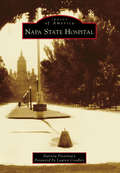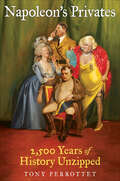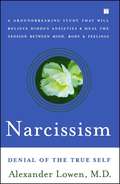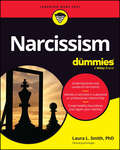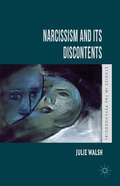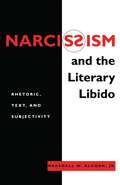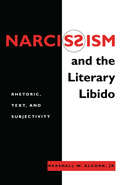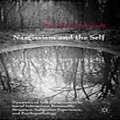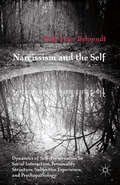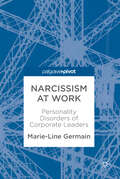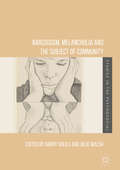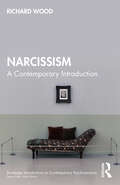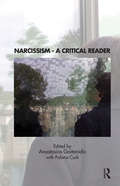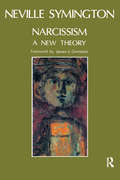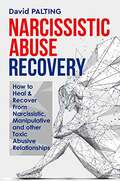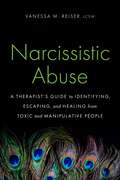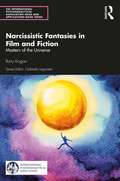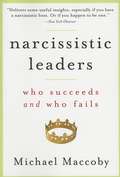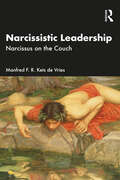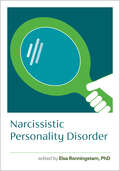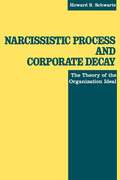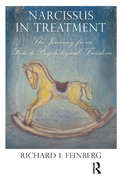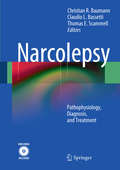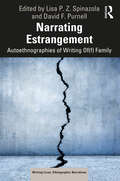- Table View
- List View
Napa State Hospital
by Lauren Coodley Patricia PrestinaryNapa, because of its natural beauty and optimal conditions for "moral treatment," was chosen as the second site for a state hospital to ease overcrowding in Stockton Asylum. When the fully self-sustaining Napa Asylum opened in 1875, it quickly filled to capacity and became home to many people suffering from mental illness, alcoholism, grief, and depression. In 1924, Napa Asylum was renamed Napa State Hospital to reflect changes in the medical model and treatments for psychiatric patients. Covering the first 100 years of the hospital's history, this unique book tells the story of the institution and the people for whom it served as employer. Known locally as Imola, this beautiful site became an integral part of the community.
Napoleon's Privates: 2,500 Years of History Unzipped
by Tony PerrottetWhen Tony Perrottet heard that Napoleon's "baguette" had been stolen by his disgruntled doctor a few days after the Emperor's death, he rushed out to New Jersey. Why? Because that's where an eccentric American collector who had purchased Napoleon's member at a Parisian auction now kept the actual relic in an old suitcase under his bed.The story of Napoleon's privates triggered Perrottet's quest to research other such exotic sagas from history, to discover the actual evidence behind the most famous age-old mysteries: Did Churchill really send condoms of a surprising size to Stalin? Were champagne glasses really molded upon Marie Antoinette's breasts? What was JFK's real secret service? What were Casanova's best pickup lines? Napoleon's Privates is filled with offbeat, riotously entertaining anecdotes that are guaranteed to amaze, shock, and enliven any dinner party.
Narcissism
by Alexander LowenNARCISSISMAre you a narcissist? Do you interact with someone who is? Contrary to popular belief, narcissists do not love themselves or anyone else. They cannot accept their true selves, constructing instead fixed masks that hide emotional numbness. Influenced by forces in culture and predisposed by factors in the human personality, narcissists tend to be More concerned with how they appear than what they feel Seductive and manipulative, striving for power and control Egotists, focused on their own interests but lacking the true values of the self -- self-expression, self-possession, dignity, and integrity Without a solid sense of self, which leads them to experience life as empty and meaninglessIn this groundbreaking study, Dr. Alexander Lowen uses his extensive clinical experience to demonstrate how narcissists can recover their suppressed feelings and regain their lost humanity. By the use of Bioenergetic Analysis, the psychotherapy created by Dr. Lowen, a new possibility of a fulfilling and authentic life is presented for people with narcissistic characteristics and for those who interact with them.
Narcissism For Dummies
by Laura L. SmithRecognize narcissists in your life and set healthy boundaries to start healing today Narcissism For Dummies pulls back the curtain on a growing and misunderstood personality. This book digs into dimensions of narcissism, grandiosity, malignancy, and vulnerability, giving you the knowledge and perspective you need to identify narcissists in your life and set limits on unacceptable behavior. It also takes a look at how society plays a part in fostering narcissism, for example through social media. You'll walk away from Narcissism For Dummies with a clearer sense of the personality trait, as well as necessary coping mechanisms and tools to deal with the narcissists in your life. Deal with narcissistic parents, bosses, coworkers, relatives, romantic partners, and beyond Discover tactics and exercises for identifying, disarming, and protecting yourself from narcissists Set limits, establish healthy boundaries, and rebuild your self-confidence Understand narcissistic personality in all its manifestations Anyone whose life has been touched by narcissism will find this book helpful, whether you're coming to terms with a loved one's diagnosis, dealing with a narcissist in the workplace, or working to move forward after leaving a narcissistic relationship.
Narcissism and Its Discontents
by Julie WalshNarcissism and Its Discontents challenges the received wisdom that narcissism is only destructive of good social relations. By building on insights from psychoanalysis and critical theory it puts forward a theorisation of narcissistic sociability which redeems Narcissus from his position as the subject of negative critique.
Narcissism and Politics
by Jerrold M. PostIn this age of narcissism, the proliferation of politicians with significant narcissistic personality features is dramatic. Driven by dreams of glory, they seem to find the spotlight that the arena of politics provides irresistible. This book analyzes narcissism and politics and systematically explores the psychology of narcissism - the entitlement, the grandiosity and arrogance overlying insecurity, the sensitivity to criticism, and the hunger for acclaim - illustrating different narcissistic personality features through a spectrum of international and national politicians. It addresses the power of charismatic leader–follower relationships, as well as the impact of age and illness on leaders driven by dreams of glory.
Narcissism and the Literary Libido: Rhetoric, Text, and Subjectivity
by Marshall W. Alcorn, Jr.What is it that makes language powerful? This book uses the psychoanalytic concepts of narcissism and libidinal investment to explain how rhetoric compels us and how it can effect change. The works of Joseph Conrad, James Baldwin, Michael Foucault, Jacques Derrida, Arthur Miller, D.H. Lawrence, Ben Jonson, George Orwell, and others are the basis of this thoughtful exploration of the relationship between language and subject. Bringing together ideas from Freudian, post- Freudian, Lacanian, and post-structuralist schools, Alcorn investigates the power of the text that underlies the reader response approach to literature in a strikingly new way. He shows how the production of literary texts begins and ends with narcissistic self-love, and also shows how the reader's interest in these texts is directed by libidinal investment.Psychoanalysts, psychologists, and lovers of literature will enjoy Alcorn's diverse and far-reaching insights into classic and contemporary writers and thinkers.
Narcissism and the Literary Libido: Rhetoric, Text, and Subjectivity (Literature And Psychoanalysis Ser. #6)
by Marshall W. Jr.What is it that makes language powerful? This book uses the psychoanalytic concepts of narcissism and libidinal investment to explain how rhetoric compels us and how it can effect change. The works of Joseph Conrad, James Baldwin, Michael Foucault, Jacques Derrida, Arthur Miller, D.H. Lawrence, Ben Jonson, George Orwell, and others are the basis of this thoughtful exploration of the relationship between language and subject. Bringing together ideas from Freudian, post- Freudian, Lacanian, and post-structuralist schools, Alcorn investigates the power of the text that underlies the reader response approach to literature in a strikingly new way. He shows how the production of literary texts begins and ends with narcissistic self-love, and also shows how the reader's interest in these texts is directed by libidinal investment.Psychoanalysts, psychologists, and lovers of literature will enjoy Alcorn's diverse and far-reaching insights into classic and contemporary writers and thinkers.
Narcissism and the Self
by Ralf-Peter BehrendtThis book renews interest in the field of narcissism, showing that narcissism can become a crystallization point for theoretical convergence and simplification. It integrates Kohut's ideas with the works of his sometimes overlooked predecessors and contemporaries (especially Federn, Adler, Horney, Sandler) and revives links between psychoanalysis, on the one hand, and ethology, philosophy, and sociology, on the other. Departing from the insight that coevolved intraspecific aggression and appeasement gestures are critically important for social behaviour, the book asserts the need to maintain feelings of safety (narcissistic equilibrium) at the heart of a wide range of normal and psychopathological phenomena. This provides support for an evolutionarily sensible definition of the self and paves the way for a deterministic approach to culture and society.
Narcissism and the Self: Dynamics of Self-Preservation in Social Interaction, Personality Structure, Subjective Experience, and Psychopathology
by R. BehrendtThe book examines how coevolved intraspecific aggression and appeasement gestures can give rise to complex social, cultural, and psychopathological phenomena. It argues that the individual's need regulate narcissistic supplies and maintain feelings of safety is the overriding determinant of human conduct and thought in mental health and illness.
Narcissism at Work
by Marie-Line GermainThis book explores the damaging effects of personality disorders in corporate leaders, particularly in regard to organizational variables including employee productivity, motivation, well-being, retention, and ultimately, the organization's bottom line. While helping employees recognize and understand the overt and covert characteristics of malignant narcissism, Narcissism at Work offers solutions and coping strategies vital for employees, industrial psychologists, human resource professionals, and organizational leaders in order to optimize business functions and increase employee well-being.
Narcissism, Melancholia and the Subject of Community (Studies in the Psychosocial)
by Julie Walsh Barry SheilsThis book brings together the work of scholars and writer-practitioners of psychoanalysis to consider the legacy of two of Sigmund Freud's most important metapsychological papers: 'On Narcissism: An Introduction' (1914) and 'Mourning and Melancholia' (1917 [1915]). These twin papers, conceived in the context of unprecedented social and political turmoil, mark a point in Freud's metapsychological project wherein the themes of loss and of psychic violence were becoming incontrovertible facts in the story of subject formation. Taking as their concern the difficulty of setting apart the 'inner' and the 'outer' worlds, as well as the difficulty of preserving an image of the coherently boundaried subject, the psychoanalytic frameworks of narcissism and melancholia provide the background coordinates for the volume's contributors to analyse contemporary subjectivities in new psychosocial contexts. This collection will be of great interest to all scholars and practitioners of psychoanalysis and the psychotherapies, social and cultural theory, gender and sexuality studies, politics, and psychosocial studies.
Narcissism: A Contemporary Introduction (Routledge Introductions to Contemporary Psychoanalysis)
by Richard WoodNarcissism: A Contemporary Introduction provides a historical overview of this key foundational concept within psychoanalytic thought.Richard Wood offers a critical overview of the theoretical landscape that characterizes the understanding of narcissism, referring to the work of Fromm, Rosenfeld, Kernberg, and Kohut, among others. He delineates and investigates three key forms of narcissism: severe, pathological narcissism that can result in extreme human suffering; narcissism that falls within the spectrum of Narcissistic Personality Disorder; and healthy forms of narcissism that are essential to successful personal, cultural, and creative development.Using clinical examples throughout, Wood aids psychoanalysts and psychologists in training and practice in recognizing, evaluating, and treating patients with narcissistic personality traits. His thorough and jargon-free approach will also support students looking for a comprehensive overview of narcissism.
Narcissism: A Critical Reader
by Anastasios Gaitanidis Polona CurkThis book provides a comprehensive review of the existing perspectives and applications of narcissism as a psychoanalytic concept that has been extremely influential in the fields of psychotherapy, social science, arts and humanities. Ten authors from different disciplines have been invited to write on the topic of narcissism as it is approached in their specialist field, resulting in an exciting and inclusive overview of contemporary thought on narcissism. This book is also a critical reader. Each author closely examined and analysed the possibilities and limitations of different views on narcissism. It is thus a very useful book both for students and experts who look for a deeper and broader understanding of the notion of 'narcissism' and its various psychotherapeutic, social and cultural applications.
Narcissism: A New Theory
by Neville SymingtonIn this book, Neville Symington approaches the well-trodden subject of narcissism, offers us fresh insights from his long clinical experience with patients suffering from this disorder, and sketches some highlights in the history of the concept of narcissism.
Narcissistic Abuse Recovery
by David PaltingBreak free from the lies, manipulation and control that are keeping you captive from the life you deserve. <p><p> You have chosen to take the initial brave steps in healing from an abusive narcissistic relationship. Not only will this book guide you through the recovery process, it also discusses: <p><p> How to recognize the narcissist’s behavior patterns in order to avoid similar relationships in the future; How your own responses can inadvertently elevate theirs; How to understand similarities and differences among narcissists, psychopaths, sociopaths, manipulators and other toxic relationships; Tactics in dealing effectively with and stopping manipulation before it has a chance to grow; Rising above hurdles that may come up by the emotional abuser as you work through recovery, such as pushing old guilt buttons, blame, manipulation or similar tactics used in the past to make you stay; Suggestions for self-care in healing from toxic relationships; The most common questions asked and answered about recovering and healing from emotional abuse. <p><p> Know that you are not alone. The process will be a difficult one that takes courage, inner strength and perseverance. With this book in hand, you’ll be able to take control of every aspect of your life. There is hope for long-term results by believing in the holistic approach outlined in this book and, most importantly, believing in yourself.
Narcissistic Abuse: A Therapist's Guide to Identifying, Escaping, and Healing from Toxic and Manipulative People
by Vanessa M. ReiserLicensed therapist and narcissism expert Vanessa M. Reiser offers a guide to identifying narcissistic abuse, especially in interpersonal relationships, sharing practical strategies for healing. Gaslighting. Love bombing. Hoovering. Triangulating. These are all insidious weapons in the narcissist&’s toolkit. Narcissism can be hard to diagnose, but it is one of the hallmarks of abusive relationships. As a therapist specializing in narcissism and domestic abuse, Vanessa M. Reiser has strategies to help victims to identify, understand, and heal from abusive relationships. With a blend of information, education, and stories, Reiser defines what narcissistic abuse is, breaks down how it&’s a form of domestic violence and how narcissists think and operate, uncovering their mindset and motivations, so readers can spot a narcissist more accurately, avoid toxic relationships, escape dangerous situations, and heal from mental, emotional and/or physical trauma. Readers will learn how to: Identify dangerous behaviors and warning signs of narcissistic abuse Create an exit strategy to safely escape from an abuser Heal from the psychological damage and trauma. Explaining narcissistic personality disorder, clarifying common misconceptions about narcissism, and detailing how narcissism works on a spectrum of benign to malignant, Narcissistic Abuse gives readers a clear picture of what narcissistic abuse entails, using specific situations and examples to show how narcissistic traits translate into real-life behaviors. Reiser describes the five stages of narcissistic abuse (luring, love bombing, mask slipping, discarding, and the smear campaign) and lists common stages and emotions that come after the relationship with a narcissist has been severed (including devastation, confusion, sadness, anger, understanding, and healing). With practical tools and a warm, empathetic tone, Narcissistic Abuse provides a clear path for readers to break the cycle and find a path back to themselves.
Narcissistic Fantasies in Film and Fiction: Masters of the Universe (The International Psychoanalytical Association Psychoanalytic Ideas and Applications Series)
by Ilany KoganThis book has grown from a belief that the psychoanalytic exploration of literature and performances leads to a richer and fuller understanding of each individual’s internal reality. It includes an exploration of narcissistic fantasies from various protagonists of film and novels and focuses on the fantasy of the omnipotence of the self, which is a predominantly narcissistic desire to be a "Master of the Universe", a deity, an omnipotent, immortal figure. Psychoanalysis and art interact in exploring the individual's refusal to give up grandiose fantasies about the self, or his inability to modulate and integrate them within his personality, which are at the origin of his wish to transcend the human condition. These narcissistic fantasies are often expressed through aggressive and self-destructive behaviour, including flirtation with death and destruction. The emotional truth that great artists convey through symbols which often resonates in the audience is examined in this book through studies and comparisons of narcissistic characters in opera, film and contemporary fiction. Identifying with these figures, who place themselves above the law, may give us the illusion of omnipotence and immortality, which corresponds to a primary narcissistic fantasy, the traces of which exist in various degrees in all of us. Part of the popular International Psychoanalytical Association Psychoanalytic Ideas and Applications Series, this book is unique in its focus on the narcissistic fantasy of the omnipotence of the self by means of an analysis of a variety of protagonists from the worlds of the performing arts and literature, and on the exploration of their impact on the audience. It will be of interest to psychoanalysts, therapists, and those with an interest in the intersection of psychoanalytic theory with film and literature.
Narcissistic Leadership: Narcissus on the Couch
by Manfred F. Kets de VriesNarcissism has become a contemporary pandemic that seems to have been normalized, accepted, and even celebrated, both in society at large and by some of our political and business leaders. In this book, world-renowned psychology and leadership thinker Manfred Kets de Vries explains this modern phenomenon and imagines how you would help the narcissist on the notional "coach’s couch."Consumerism, competitive urges, individualism, and identity politics are examples of how our present-day culture has reinforced the self-glorification that drives narcissism—this cult of the self. Although a healthy competitive spirit is part of human nature, for narcissistic people it can turn into an all-consuming character trait. They view the world almost exclusively in terms of “winners” and “losers,” and to lose is unacceptable. Unfortunately, social media seems to provide ample opportunities to magnify the competitive or narcissistic disposition present in all of us.Starting with an in-depth discussion of the ancient myth of Narcissus, the various shapes in which narcissism expresses itself are highlighted. Subsequently, taking individual and group perspectives, various strategies for how to manage narcissistic people are explored. Using case examples of interpersonal and group approaches to change, concepts such as the working alliance, the emotional seesaw, the grey rock approach, boundary management, Socratic questioning, the sandwich tactic, and the need to be empathic are introduced. Also, referring to change in a group setting, the importance of the psychological dynamics of the group-as-a-whole is presented.Narcissistic Leadership offers a unique and original approach to exploring the ramifications of narcissistic leadership and will be of interest to the general reader as well as the key audiences of organizational leaders, psychoanalysts, coaches, psychotherapists, sociologists, and social psychologists.
Narcissistic Personality Disorder
by Elsa RonningstamThis volume presents significant recent advances in research and clinical practice in the area of pathological narcissism and narcissistic personality disorder (NPD). Originally published as a Special Supplement to the Journal of Personality Disorders, the book brings together leading clinical experts. Chapters examine the neuroscientific and psychological underpinnings of NPD, describe cutting-edge diagnostic approaches, and explore the complexities of the therapeutic relationship. Addressing the "dos and don'ts" of clinical work with this population, the book reviews the status of specialized treatment strategies--such as transference-focused psychotherapy and mentalization-based treatment--and identifies important directions for future research.
Narcissistic Process and Corporate Decay: The Theory of the Organizational Ideal
by Howard S. SchwartzHoward S. Schwartz shows how American industry is in a process of decay unable to cope with foreign competition and stagnant in technological development. He attributes this Organizational Decay to a reluctance in the part of corporate members to deal with reality.
Narcissus in Treatment: The Journey from Fate to Psychological Freedom
by Richard I. FeinbergThis book explores the nature of psychic suffering due to the narcissistic drama and how one can emerge over time to live an autonomous life. The narcissistic drama involves the saga of narcissistic wounding in childhood, resulting from narcissistic parenting, eventually giving way to emotional pain in adulthood marked by feelings of unworthiness and lack of genuine purpose. The dynamics of the narcissistic drama are herein demonstrated through an analysis of experience in D. H. Lawrence's autobiographical novel, Sons and Lovers. The emotional suffering depicted in this novel provides a pristine picture of the drama itself.The focus of this book subsequently takes up the question of what narcissistically injured adults can do to become free from the constraints of this drama. This is accomplished through a discussion about the nature of therapeutic action. This discussion centres on describing a therapeutic approach to resolve psychic defenses that have led to blocks in emotional growth and the progressive formation of the mind. The aim of therapeutic action is to put old ghosts to rest and pave the way towards psychological birth and freedom.
Narcolepsy
by Thomas E. Scammell Claudio L. Bassetti Christian R. BaumannThe field of narcolepsy has developed enormously within the last 10 years. Indeed the understanding of the basics of sleep-wake regulation and the discovery of new neurotransmitter systems (the hypocretins) has boosted research and key findings in the field, providing important insights into how sleep is regulated. Consequently narcolepsy now receives a great deal of attention from both clinicians and scientists throughout the world. Narcolepsy: Pathophysiology, Diagnosis, and Treatment not only offers an engaging and comprehensive treatment of a fascinating disorder but also includes a DVD that offers a unique and large collection of movies displaying the symptoms of narcolepsy in people and animals. Written by some of the best experts in the field, the book focuses on the pathophysiology of the problem and also provides critical, up-to-date insights on the key clinical issues: how to diagnose the disorder, how to treat it, and how to best manage psychosocial problems. The first and only guide to span the latest advances in narcolepsy, this reference provides sections in etiology, neurochemistry, the role of the hypocretins in sleep-wake regulation, animal models in narcolepsy, the key role of the hypothalamus, REM-sleep dysregulation, diagnosis and classification, and treatment. Compiled by an international group of more than 30 authors, Narcolepsy: Pathophysiology, Diagnosis, and Treatment is an indispensable resource for all clinicians and scientists with an interest in narcolepsy.
Narrating Estrangement: Autoethnographies of Writing Of(f) Family (ISSN)
by Lisa P. Z. Spinazola David F. PurnellThe stories in Narrating Estrangement: Autoethnographies of Writing Of(f) Family demonstrate the pain, anguish, and even relief felt by those who contemplate estranging or who are estranged, whether by choice or circumstance. Despite the social assumptions persisting about the everlasting nature of family relationships, when people make the complicated and often difficult decision to disconnect from family members, they experience shame, stigma, and isolation because of social pressures to maintain those relationships at all costs.Each contributor uses the act of storytelling and the autoethnographic mode of scholarship and writing to find clarity in their individual, unique, and complex situations. Several authors’ explorations restore some of what they have lost through estrangement—such as a sense of identity, emotional health and well-being, and feelings of belonging—due to the breakdowns in social and family support systems meant to be unconditional and "permanent." The stories display the wide array of reasons why family members become estranged, delving into different types of estrangement, permanent and/or intermittent. In doing so, the writers in this book demonstrate that family relationships are neither easily categorized nor neatly ended—their impact on an individual’s life continues and changes, even in and through estrangement.This book adds to the ongoing scholarly conversations about family estrangement for students and researchers interested in autoethnography and qualitative inquiry, in a wide range of disciplines in the social sciences, healthcare, and communication studies.
